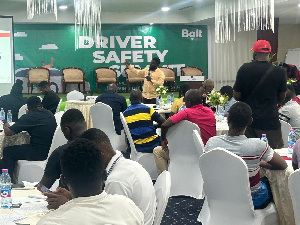On December 16, 2024, the National Commission on Small Arms and Light Weapons (NACSA) participated in a vital training session titled Driver Safety Summit, organized by Bolt in Kumasi. The session, attracted about 150 participants, including drivers and other key stakeholders in the ride-hailing transport sector.
The National Commission on Small Arms and Light Weapons (NACSA) actively participated in the session, underscoring the significant role transport systems worldwide play in the movement of illicit small arms.
Mr. Emmanuel Kenneth Oduro, an Assistant Research Officer from NACSA's Ashanti Regional Office, led the session on behalf of the Commission. The session aimed to raise awareness about the dangers of illicit small arms and light weapons (SALWs), educating participants on how transportation services like Bolt could play a key role in curbing the illegal movement of such arms.
The presentation, titled Combating Illicit Small Arms Proliferation: The Role of Bolt Service Providers, focused on several vital issues. First, it provided an overview of NACSA’s ongoing efforts to control and reduce the flow of illicit small arms into Ghana. It also addressed the role transport services play in facilitating the operations of illicit arms traffickers. In Ghana, individuals involved in the transportation of goods—including bus, taxi, trotro drivers, parcel officers, and ‘mates’ as well as Bolt drivers,—may unknowingly or knowingly assist in the movement of illicit firearms.
Participants were educated on the tactics used by criminals to transport arms and the severe legal consequences drivers could face if found unintentionally involved in such activities. The presentation stressed the importance of vigilance, urging drivers to identify suspicious behavior and report it promptly to the authorities.
In addition, Mr. Oduro highlighted the legal implications of transporting small arms, emphasizing that the burden of proof lies with anyone found transporting or possessing illicit firearms, as outlined in Section 192 (1) of the Criminal and Other Offences Act, 1960 (Act 29). He stressed that convictions under this law are severe, with penalties ranging from a minimum sentence of 10 years to life imprisonment.
The session further provided practical recommendations for Bolt drivers to enhance safety during their operations. One major suggestion was for drivers to be cautious when picking up parcels, luggage, or backpacks. It was advised that they implement a declaration form for any item being carried in their vehicles. This precaution would help prevent drivers from unknowingly transporting concealed firearms and/or ammunition.
The presentation also highlighted the importance of in-car surveillance systems. These systems would allow Bolt management to monitor both the driver and the rider during trips, helping to track and assess any unusual or suspicious activity. Such measures would provide a layer of security and accountability, enhancing overall safety during rides.
Participants were reminded of their critical role in national security. By remaining observant and reporting any suspicious activities, drivers and other stakeholders can play an essential part in the ongoing efforts to combat the illegal arms trade, helping ensure the safety and security of all Ghanaians.
The training session concluded with a powerful call to action for both Bolt management and drivers to collaborate with NACSA and other security agencies in the fight against illicit arms trafficking. By staying vigilant and proactive, transport service providers can significantly reduce the movement of illicit small arms, contributing to a safer and more secure Ghana.
Click to view details



General News of Thursday, 19 December 2024
Source: Small Arms Commission

















